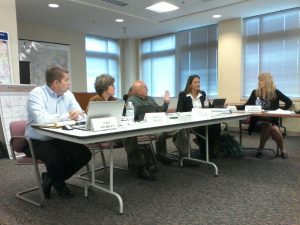State legislation furthers local government consolidation
Gregory Harutunian — August 2, 2016
The McHenry County Board’s township consolidation task force members (from left) Mike Shorten, Donna Kurtz, Roger Naylor, Michelle Aavang and chairperson Carolyn Schofield, discuss their options, during an August 2015 meeting. (Photo by Gregory Harutunian/for Chronicle Media)
Two pieces of legislation aimed at local government reduction were signed into law by Gov. Bruce Rauner, renewing debate on the issue of more than 7,000 units of state government needing to be reviewed and trimmed.
Both bills were sponsored by state Rep. David McSweeney (R-Barrington Hills) and state Sen. Thomas Cullerton (D-Villa Park).
House Bill 4379, which went into effect July 25, created the Local Government Travel Expense Control Act, in prohibiting local government officials from being reimbursed for entertainment expenses while limiting expenses for travel, meals and lodging. The impetus for the action, according to a press release, was to prevent excessive costs by community colleges, school districts, and other local governments.
“This new law is welcome news for taxpayers,” said McSweeney. “Illinois has the highest property taxes in the nation. We need to make sure our tax dollars are being used wisely, and we need to reduce property taxes. I thank Sen. Thomas Cullerton for sponsoring the legislation in the Senate, and the governor for acting quickly to sign it into law.”
The measure cleared both the House and Senate without opposition, and targeted the controversy surrounding the expenses of former College of DuPage president Robert. The accountability format is also extended to local units of government.
On July 26, Rauner signed Senate Bill 2994, which requires each county to prepare a report for the Illinois General Assembly that identifies “any unit of local government, special district, or other governing body whose membership is appointed in whole, or in part, by the county board, board of county commissioners, county board chairman or president, or county executive.”
The new legislation stipulates that the reports must be completed and filed no later than Jan. 1, 2017 with information on the name and location of each agency, a description of its services, any plans in process of for the unit’s consolidation or dissolution, and indicate its ability to levy a property tax including part of an equalized assessed valuation (EAV) percentage. Further, if it cannot forward a levy, an explanation of its funding mechanism must be submitted. It also renews the debate centering on township consolidation, and the controversy that embroiled the McHenry County Board, through most of 2015.
“Illinois has about 7,000 units of local government,” said McSweeney. “Surely, we can find a way to reduce the number of units of local government and make Illinois government smaller, more efficient and ultimately less costly to taxpayers. Fewer layers of government will help reduce property taxes.”
In February 2015, Rauner signed an executive order that established the Local Government Consolidation and Unfunded Mandates Task Force. The 25-member panel was charged with identifying issues concerning local authority and school district consolidations for inherent redundancy. It was chaired by Lt. Gov. Evelyn Sanguinetti.
Locally, a volunteer group, the McHenry County Citizens For Township Consolidation, filed petitions with the county board seeking the possible reduction of 17 townships within McHenry, as a cost-saving measure to eliminate the duplication of essential services, and condense them into 8 entities. There were also 136 elected officials currently serving in township capacities.
County board chairman Joe Gottemoller convened a five-person panel to research four proposed consolidation scenarios, and forward its recommendations to the full board. It was unable to complete the mandate, due to economic inequalities between township tax levies and the EAV disparities between them. Board members voted down the idea of consolidation at an Oct. 14 meeting.
Sanguinetti’s panel recommended consolidation of local governments later that year, without specific steps to implement effective change. Rauner’s approval of the current legislation requiring and itemization of local governmental agencies is being viewed as an inventory for future actions.
“This means, hopefully, lower property taxes, because we need to reduce wasteful local government spending,” said McSweeney.



